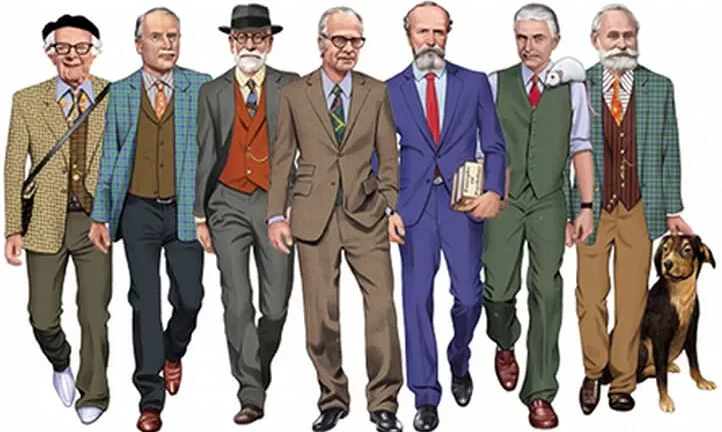Psychology is the science that studies perception, behavior, feelings, thoughts, actions, and other mental processes of a person. It seeks to answer questions about why we do what we do and how emotions, experiences, and thoughts shape our lives. Renowned psychologists such as Freud, Jung, Maslow, and many others have made significant contributions to this understanding by providing key theories and methodologies. The role of psychology in human life is hard to overestimate: it helps us understand ourselves, improve relationships, overcome difficulties, and strive for self-improvement.
Psychological research plays a crucial role in understanding the human mind and behavior. Here are a few reasons why they are significant:
- Understanding human nature. Psychological research helps us unlock the mysteries of human consciousness, motivations, emotions, and behavior.
- Application in practice. Research-based methods and techniques are used in clinical practice, education, business, and many other fields.
- Helping solve problems. Psychological research provides tools and solutions to overcome various mental and emotional issues.
- Predicting behavior. Knowledge of how people think and react allows for predicting their actions in different situations.
- Shaping policy. The results of psychological research are used by governments and organizations to shape policies in healthcare, education, and social welfare.
- Effective learning. Psychological research in education helps develop teaching methods that improve information retention and skill development.
- Technological development. Understanding human behavior and perception is important in creating user interfaces, virtual reality, artificial intelligence, and other technologies.
- Ethical aspect. Research helps establish ethical standards in psychological practice, protecting the interests of patients and research participants.

A Brief History of Psychology
The evolution of psychology from ancient times to the present is a multi-stage process in which renowned psychologists and their theories have played a crucial role.
- Ancient Times. Philosophers like Socrates and Plato were already contemplating mental phenomena, engaging in the earliest studies of the human mind.
- Middle Ages. During the Middle Ages, psychological questions were mainly based on religious teachings, but ideas about the nature of the mind began to emerge.
- The Age of Enlightenment. Philosophers such as Descartes began to separate the body and spirit, laying the foundation for modern psychology.
- 19th Century. During this time, famous psychologists like W. Wundt and S. Freud made significant contributions to the establishment of psychology as a science. Freud founded psychoanalysis, while Wundt created the first psychological laboratory.
- 20th Century. Renowned psychologists J. Watson and A. Maslow developed various schools and directions in psychology, such as behaviorism and humanistic psychology.
- Late 20th Century – Present. Today, psychologists continue to contribute to the development of cognitive psychology, neuropsychology, evolutionary psychology, and positive psychology.
The Golden Age of Psychology
The Golden Age of Psychology (approximately from the 1890s to the 1960s) was a period when the science of the human mind and behavior reached unprecedented heights, enriched by numerous discoveries, theories, and practices. This era witnessed renowned psychologists from various schools and directions actively collaborating, combining their knowledge for a better understanding of the human psyche.
During this period, psychology ceased to be merely a theoretical discipline and became a science with practical applications, making a significant contribution to medicine, education, business, and other areas of life. Many concepts and methods began to be actively implemented in everyday life, helping people cope with psychological difficulties and better understand themselves and others.
Thus, the Golden Age of Psychology can be confidently described as a time when the science of the human mind, thanks to the efforts of renowned psychologists, found its place in the hearts and minds of many, becoming an indispensable part of the modern world.
Sigmund Freud and Psychoanalysis
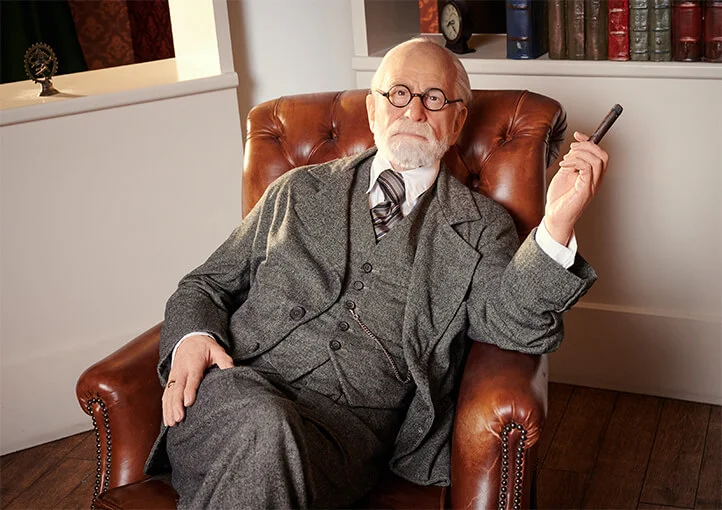
Sigmund Freud, an Austrian neurologist and psychiatrist, is considered the founder of psychoanalysis—a field in psychology and psychotherapy that laid the foundation for understanding deep, often hidden, mental processes. His contributions to psychology and understanding the human mind are hard to overestimate.
The core of psychoanalysis is the idea that most of our actions and feelings are determined by unconscious desires, fears, and conflicts, many of which have their roots in early childhood. Freud proposed a structural model of the psyche, dividing it into three levels: the “Id,” the “Ego,” and the “Superego.”
- Id — The primal part of the psyche that operates on the pleasure principle. The Id encompasses instincts and basic desires.
- Ego — The conscious part of the personality that makes decisions and acts in the real world. The Ego tries to balance the demands of the Id with the constraints of reality.
- Superego — The moral compass of the individual, formed under the influence of education and culture. It represents the inner voice that guides our behavior according to social norms and morality.
One of Freud’s most well-known methods for exploring the unconscious is free association. Patients would say whatever came to mind, allowing the analyst to look for hidden patterns and unconscious conflicts.
Over time, Freud’s methods and theories became subjects of criticism and modification, but his influence on psychology, culture, and art in the 20th century remains undeniable. Freud’s radical ideas revolutionized the understanding of the human psyche and laid the foundation for many modern psychotherapeutic practices.
Carl Jung and Analytical Psychology
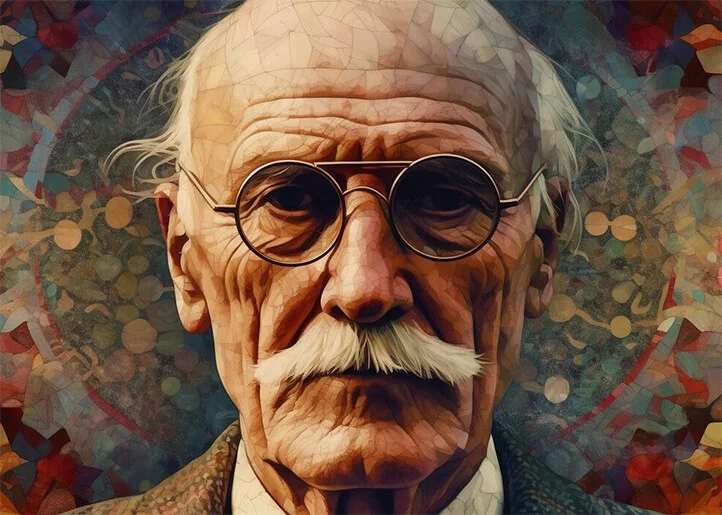
Carl Gustav Jung was a Swiss psychiatrist and psychoanalyst whose ideas and theories had a profound influence on psychology, philosophy, art, literature, and even religious studies. He began his career as a supporter of Sigmund Freud, but later diverged from Freud, developing his unique approach to psychoanalysis known as analytical psychology.
Key ideas and concepts of Jung’s analytical psychology:
- Collective Unconscious. According to Jung, in addition to the personal unconscious (as proposed by Freud), every person also has a collective unconscious—a shared set of images and symbols that is hereditary and common to all humanity. He called these images archetypes.
- Archetypes are universal images or symbols, such as the Hero, the Mother, the Shadow, the Anima, and the Animus. They are the fundamental building blocks of our collective unconscious and are manifested in myths, fairy tales, religions, and individual dreams.
- Process of Individuation. A central theme in Jung’s work is the process of individuation, or the individual’s journey towards self-realization, understanding their uniqueness, and integrating various aspects of their personality.
- Personality Typology. Jung developed a theory of psychological types, which became the foundation for many modern personality assessment tools, such as the Myers-Briggs Type Indicator.
- Symbolism and Depth Psychology. Jung paid special attention to the study of religion, myths, and alchemy, believing they contain keys to deep psychological processes.
Alfred Adler and Individual Psychology
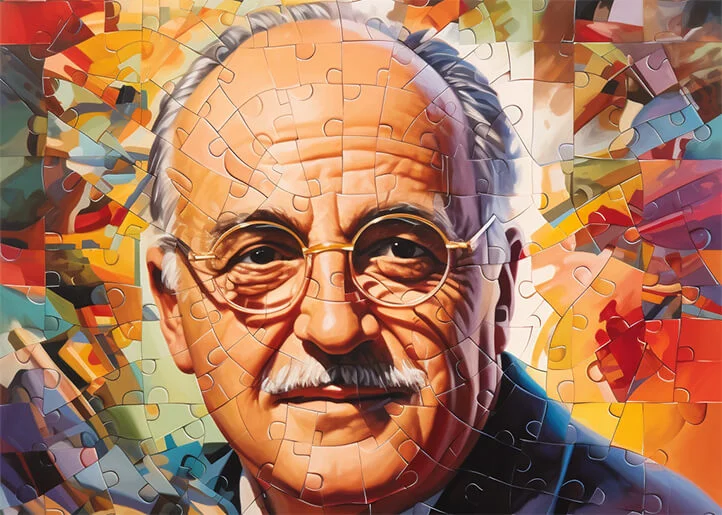
Alfred Adler was an Austrian psychiatrist and psychotherapist who initially was an active collaborator of Sigmund Freud. However, over time, differences in their views on psychoanalysis became evident, leading Adler to establish his own approach to psychotherapy, known as individual psychology.
Key concepts of Adler’s individual psychology:
- Striving for Superiority. Unlike Freud, who believed that sexual impulses were the primary driving force of behavior, Adler argued that the main motive of human behavior is the striving for superiority or self-improvement.
- Inferiority Complex. Adler claimed that many of our adult aspirations and complexes stem from feelings of inferiority experienced during childhood. These feelings can arise due to physical deficiencies, weaknesses, or other factors.
- Lifestyle. Each person develops a unique “lifestyle” in early childhood, which determines how they cope with problems, strive for superiority, and interact with others.
- Social Interest. Adler considered social interest, or a sense of community and belonging to humanity, to be one of the key factors in mental health. In his view, a lack of such interest can lead to psychopathology.
- Birth Order. According to Adler, the birth order of children in a family (firstborn, middle child, youngest, only child) has a specific influence on their personality development and lifestyle.
Adler’s contributions to psychology and psychotherapy are immense. His ideas about self-esteem, social interaction, and an individualized approach to understanding personality have formed the basis of many modern psychotherapeutic methods. While he differed in his views from Freud and Jung, his approach to psychotherapy complemented and enriched the field of psychoanalysis.
Behavioral Psychology
Behavioral psychology is a branch of science that focuses on observable behavior of individuals rather than internal mental processes or feelings. Emerging in the early 20th century as a reaction to the intuitive and non-empirical methods of psychoanalysis and introspection, it quickly became the dominant approach in psychology, particularly in North America.
Renowned psychologists like Watson and Skinner believed that for a scientific understanding of psychology, it was essential to focus on observable behaviors that could be measured and quantified. Rejecting the study of consciousness, which is not measurable, they chose to concentrate on reactions and actions that could be observed and analyzed in controlled conditions.
This radical shift in focus led to numerous innovations in research methods and understanding of human behavior. The behavioral approach gave rise to new methods of teaching, therapy, and behavior modification that have had a profound impact on education, clinical practice, and even advertising and business.
John Watson and the Foundations of Behavioral Psychology
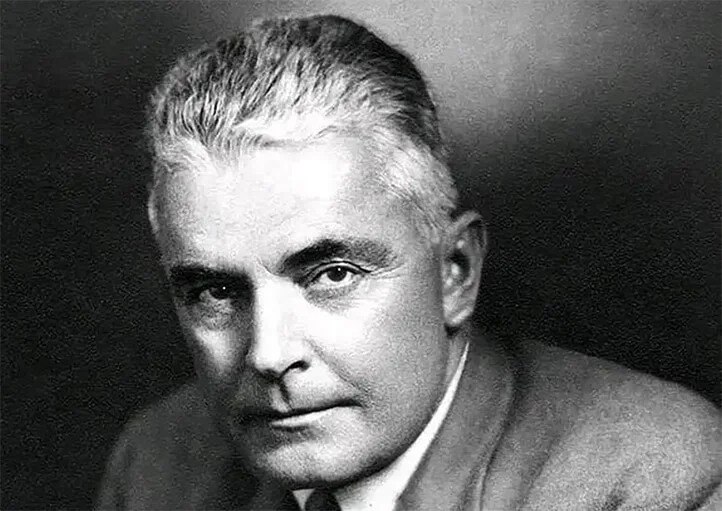
John Broadus Watson was one of the key figures in the development of behavioral psychology. Born in 1878, he was a pioneer in applying experimental methods to the study of human behavior and argued that psychology should be a purely objective science, devoid of any subjectivity.
- Psychology as a Behavioral Science. Watson believed that psychology should study only what can be observed and measured. He argued that internal processes, such as thoughts and feelings, cannot be the direct object of scientific research because they cannot be measured or directly observed.
- Critique of Introspection. Watson was a staunch critic of the introspection method, which was used by many psychologists of the time to explore inner experiences. He claimed that such a method was unobjective and not sufficiently scientific.
- “Little Albert” Experiment. One of Watson’s most famous experiments involved a baby known as “Little Albert.” This experiment illustrated how emotional reactions could be conditionally formed in a human, in this case—fear of white rats.
- Development in Advertising. After leaving academia, Watson applied his knowledge of behavioral psychology to advertising, becoming one of the pioneers in the field of consumer behavior study.
John Watson’s contributions to psychology cannot be underestimated. His ideas and methods of studying behavior laid the groundwork for many subsequent studies in this field, and his approaches paved the way for the modern understanding of behavioral psychology.
B.F. Skinner and Operant Conditioning
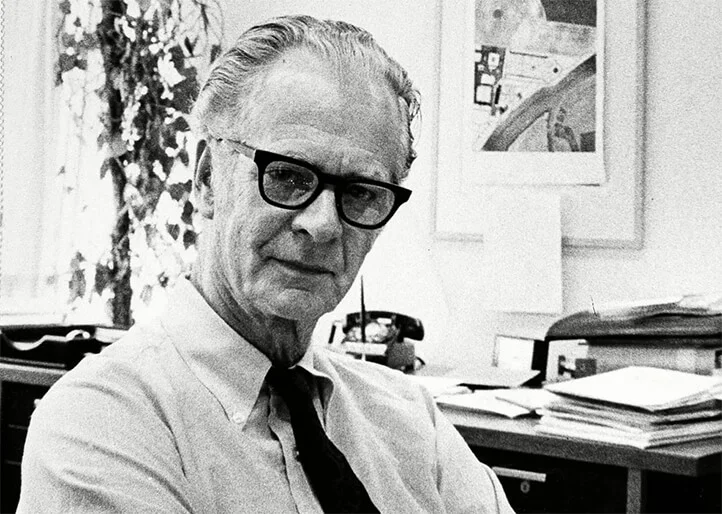
Burrhus Frederic Skinner was an American psychologist who made a significant contribution to the development of behavioral psychology. His most notable achievement was the development of the concept of operant conditioning.
- Operant Conditioning. Unlike classical conditioning, which was studied by Ivan Pavlov, where a stimulus precedes a response (such as a bell ringing before food is presented), operant conditioning focuses on how subsequent events (reinforcements or punishments) affect the likelihood of behavior being repeated.
- Reinforcement and Punishment. Skinner identified two main types of consequences that can modify behavior: reinforcement (which increases the likelihood of the behavior being repeated) and punishment (which decreases this likelihood).
- Skinner Box. To study operant conditioning, Skinner developed a device known as the “Skinner Box.” This apparatus allowed for the study of animal behavior (most commonly rats or pigeons) in a controlled environment where their actions could be automatically reinforced or punished.
- Applications in Education and Therapy. Skinner believed that the principles of operant conditioning could be applied to guide and modify human behavior. He proposed using them in educational methods and therapeutic approaches.
Albert Bandura and Social Learning
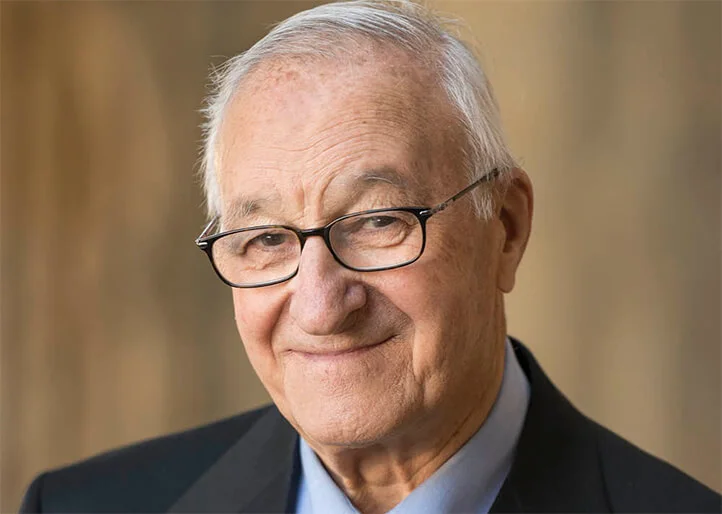
Albert Bandura was a renowned psychologist whose research in social learning and modeling significantly influenced the understanding of learning processes and personality development. His theory of social cognitive learning suggests that people learn not only from their own experiences but also by observing the behavior of others.
- Social Learning Theory. Bandura asserted that people learn by observing the behavior of others, its consequences, and reactions. This process is known as observational learning or modeling.
- Bobo Doll Experiment. In one of his most famous experiments, children watched adults behave aggressively towards an inflatable doll called Bobo. Afterward, the children were more likely to interact with the doll in a similarly aggressive manner, demonstrating that they had learned this behavior through observation.
- Concept of Self-Efficacy. Bandura also developed the concept of self-efficacy—the belief in one’s ability to successfully perform tasks or achieve goals. According to him, self-efficacy plays a crucial role in motivation, personal growth, and achieving success.
- Triadic Reciprocal Determinism. Bandura proposed a model of interaction between three factors: personality, behavior, and environment. These three elements interact with each other, and each influences the other two.
Bandura’s work significantly expanded the understanding of the mechanisms of social learning and the influence of the environment on personality formation. His research showed that people are active participants in their learning and development, not just passive recipients of stimuli and rewards.
Humanistic Psychology
Humanistic psychology emerged in the mid-20th century as a reaction to the dominance of behavioral and psychoanalytic approaches in psychology. This perspective focuses on human individuality, aspects of personal growth, and self-realization. Unlike other approaches, humanistic psychology views individuals as striving for self-development and self-determination.
Renowned psychologists such as Abraham Maslow and Carl Rogers made significant contributions to the development and popularization of humanistic psychology. They argued that to understand human nature, one must consider the higher needs and aspirations of individuals, as well as their inner resources.
The central concepts of humanistic psychology are the need for self-actualization, a positive self-concept, and a focus on the individual’s current experience. This approach asserts that each person possesses a unique potential for growth and development.
Abraham Maslow and the Hierarchy of Needs

Abraham Maslow was one of the most influential figures in humanistic psychology, best known for his concept of the hierarchy of needs. His work has had a profound impact on various fields, including education, management, and psychotherapy.
Maslow suggested that people have a series of basic needs arranged in a hierarchical order. These needs are divided into the following levels:
- Physiological Needs. These are fundamental needs such as food, water, sleep, and other biological necessities essential for survival.
- Safety Needs. Once physiological needs are met, people seek safety and stability in their lives.
- Social Needs. These are the needs for belonging, love, friendship, and communication.
- Esteem Needs. These relate to respect, recognition, and status.
- Self-Actualization Needs. This is the need to realize one’s own potential, self-expression, and goal achievement.
Maslow argued that until the lower needs are satisfied, higher needs will not be activated. And once the lower level of needs is fulfilled, people will automatically strive to satisfy the next level.
Maslow’s work on the hierarchy of needs remains relevant to this day. It helps to understand the motivation behind people’s behavior and the nature of their aspirations in various life circumstances.
Carl Rogers and Client-Centered Psychotherapy
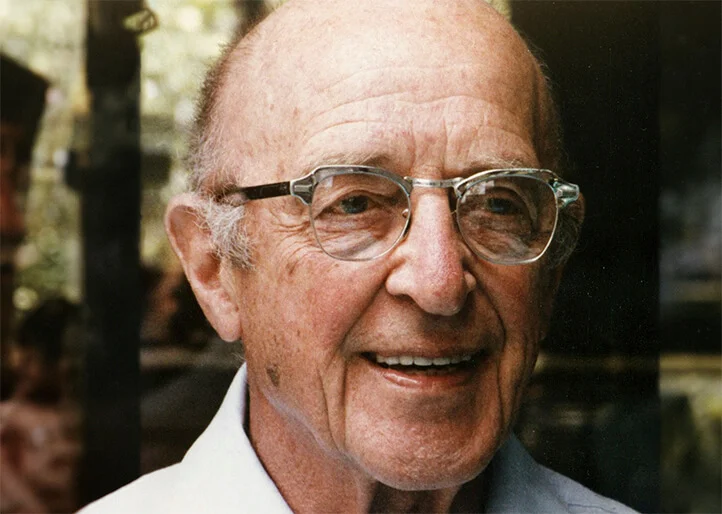
Carl Rogers was another leading figure in humanistic psychology, whose contribution to psychotherapy is invaluable. He developed an approach known as client-centered psychotherapy, which places the individual and their experiences at the center of the therapeutic process.
- Core Principles. In client-centered psychotherapy, the therapist aims to create a supportive, positive, empathetic, and genuine atmosphere in which the client feels free and safe to explore their feelings and experiences.
- Role of the Therapist. Rogers believed that the primary task of the therapist is to provide a supportive, non-judgmental environment where the client can delve into their true feelings and desires.
- Self-Understanding and Growth. The goal of client-centered psychotherapy is to help the client see and accept their true nature and move toward personal growth and self-actualization.
- Applications. This approach has been used in various fields, including education, psychological counseling, and management, and continues to be applied in psychotherapeutic practice worldwide.
Carl Rogers and his client-centered psychotherapy embody the humanistic philosophy that emphasizes respect for human individuality and a belief in the person’s inner potential.
Cognitive Psychology
Cognitive psychology is a relatively young branch of science that focuses on the processes of cognition. This approach examines how people perceive, remember, think, solve problems, and engage in other mental activities. While classical schools of psychology focused on observable behavior or deeply hidden unconscious processes, cognitive psychology has become a “bridge” connecting these two approaches by studying the internal processes underlying behavior.
Famous psychologists in the field of cognitive psychology have sought to decipher the complex mechanisms underlying human thought. Thanks to their work, we now have a deep understanding of phenomena such as perception, attention, memory, and language.
In today’s world, where information plays a key role, understanding cognitive processes is becoming increasingly relevant. Cognitive psychology continues to evolve, integrating with other disciplines and being applied in various fields, from education to technology and medicine.
Jean Piaget and the Stages of Cognitive Development in Children
Jean Piaget was a Swiss psychologist whose theory of the stages of cognitive development in children has become one of the most influential in this field.
- Sensorimotor Stage (from birth to 2 years). At this stage, infants explore the world through their senses and movements. They learn to overcome spatial obstacles and begin to understand that objects continue to exist even when they are not visible (object permanence).
- Preoperational Stage (2-7 years). During this period, children start using symbols and language to represent the world, but their thinking is still quite egocentric, and they often have difficulty understanding other people’s perspectives.
- Concrete Operational Stage (7-11 years). At this stage, children begin to think logically about concrete situations. They understand the laws of conservation (for example, the amount of water remains the same even if it is poured into a container of a different shape).
- Formal Operational Stage (from 12 years and older). During this period, adolescents begin to think abstractly, use deductive reasoning, and formulate hypotheses.
Piaget believed that children actively participate in their cognitive development, and their understanding of the world is shaped through processes of assimilation (incorporating new information into existing schemas) and accommodation (altering schemas based on new information).
Jean Piaget’s work laid the foundation for many subsequent studies in the fields of education and child development. Although some of his theories have been criticized and revised, Piaget’s contribution to understanding child development remains invaluable.
Albert Ellis and Rational-Emotive Therapy
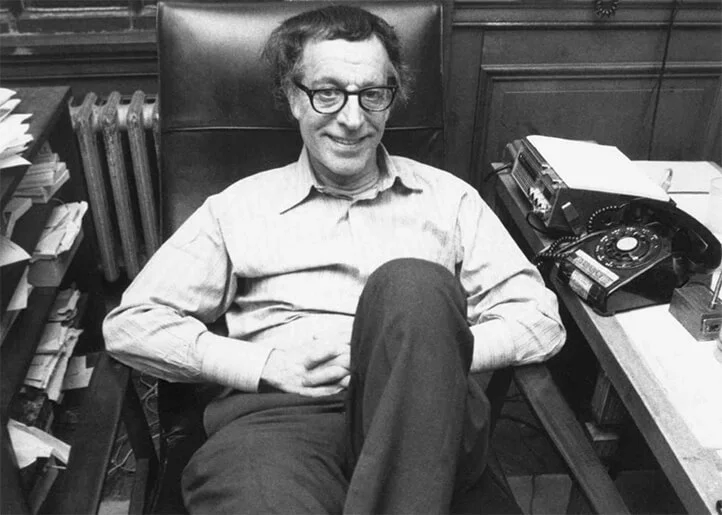
Albert Ellis was an American psychotherapist and the founder of Rational-Emotive Therapy (RET). Ellis’s work made a significant contribution to the evolution of psychotherapy and helped shape the cognitive-behavioral approach, which is now one of the dominant forms of psychological assistance.
The main principle of RET is that it is not the events themselves that cause our emotions, but our perception and interpretation of these events. Ellis argued that many emotional problems arise from irrational beliefs that people maintain. These irrational beliefs can be identified and replaced with more rational and adaptive ones.
The RET process includes:
- Identifying Irrational Beliefs. The therapist helps the client recognize and identify their irrational beliefs that underlie their problems.
- Challenging Irrational Beliefs. After identifying them, the therapist and client analyze these beliefs, examine their inconsistency with reality, and assess their destructiveness.
- Replacing Irrational Beliefs. The goal is to help the client develop a more rational and adaptive view of the world.
Ellis also created the well-known list of the “Ten Irrational Beliefs,” which helps clients better understand the thoughts and beliefs that may underlie their emotional problems.
Ellis’s Rational-Emotive Therapy has had a profound impact on the development of cognitive-behavioral therapy and continues to be a relevant and effective method of psychological assistance.
Aaron Beck and Cognitive-Behavioral Therapy
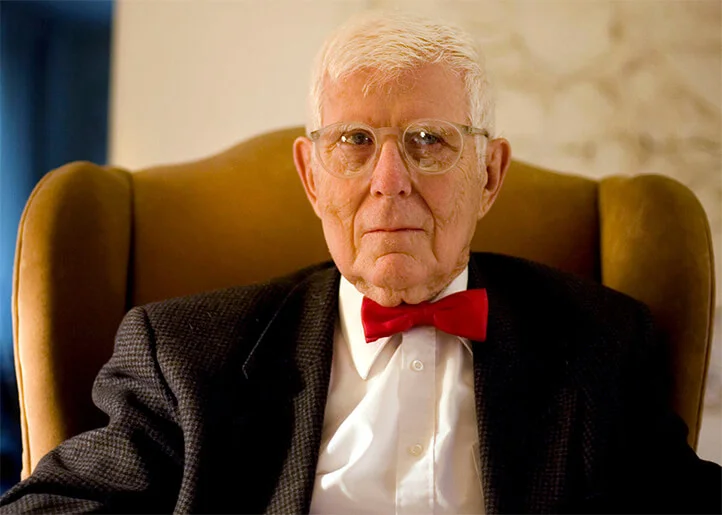
Aaron Beck is a prominent American psychiatrist who is considered one of the founders of Cognitive-Behavioral Therapy (CBT). His research in depression and approaches to psychotherapy laid the groundwork for one of the most effective and widely used forms of psychotherapy in the world.
Early in his career, Beck worked in the field of psychoanalysis, but he gradually noticed that many patients with depression exhibited systematic negative thoughts about themselves, the world, and the future. These “automatic thoughts” tended to be distorted and generalized, and Beck hypothesized that they play a key role in the onset and maintenance of depression.
Key principles of CBT include:
- Cognitive Analysis. Psychological problems are often linked to distorted perceptions, misinterpretations of events, or negative thinking.
- Collaboration. The therapist and patient work together as a team to identify and challenge these distortions.
- Structured Approach. CBT often focuses on current problems and uses structured methods and exercises.
- Education. Patients are taught skills and techniques that help them independently challenge negative thinking and change their behavior.
Beck developed several scales and tools for assessing depression, anxiety, and other psychological disorders, which are widely used by professionals worldwide today. Thanks to the work of Aaron Beck and other renowned psychologists, CBT is considered one of the most evidence-based and effective approaches for treating a wide range of mental disorders.
Famous Psychologists and Modern Trends
The contemporary world of psychology is a fertile ground for new research, innovations, and discoveries. Technological advancements have enabled scientists to delve deeper into the human mind, opening up new horizons in understanding the psyche. Today, renowned psychologists work hand in hand with professionals from various fields to ensure interdisciplinary collaboration and in-depth study of psychological phenomena.
While classical theories and methods continue to play a key role in psychological practice, new approaches and paradigms are constantly reshaping the landscape of psychology. These innovations span everything from psychotherapy and clinical practice to organizational psychology and user experience design.
Modern psychologists are also increasingly focusing on global issues such as climate change, migration, and globalization. These issues pose new challenges for researchers, requiring combined efforts and integrative approaches to understanding human nature and behavior.
Martin Seligman and Positive Psychology
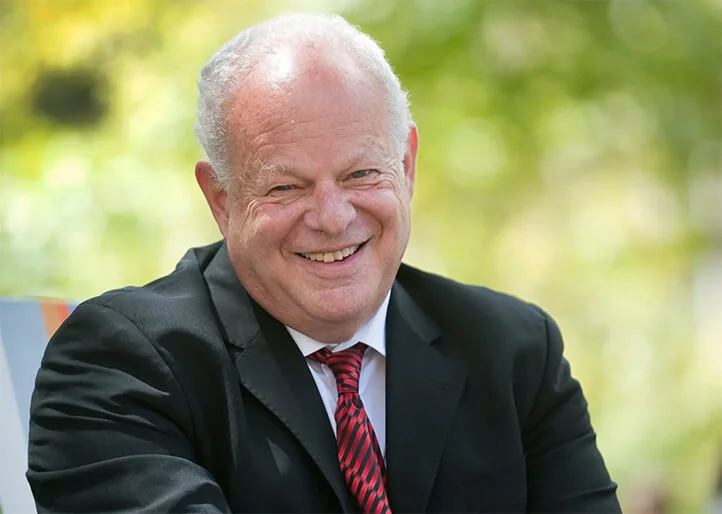
Martin Seligman is one of the most prominent figures in contemporary psychology, whose research and theories have significantly influenced the thinking of many specialists. Initially known for his research on “learned helplessness,” his most substantial contribution is related to the development and popularization of positive psychology.
Positive psychology is a branch of psychology that focuses on studying and promoting the positive aspects of human life: happiness, well-being, meaning in life, and personal growth. Instead of focusing on dysfunctions, problems, and pathologies, positive psychology explores what makes life worth living, fulfilling, and happy.
In 1998, as the president of the American Psychological Association, Seligman challenged himself and other psychologists to rethink their approach to psychological science and practice. He encouraged specialists not only to treat mental illnesses but also to enhance people’s potential, helping them to live more complete and happier lives.
Seligman also proposed a model of well-being, identifying five key elements of a happy and fulfilling life known as PERMA: Positive Emotions (P), Engagement (E), Relationships (R), Meaning (M), and Accomplishment (A). This model has become the basis for much research and practice in positive psychology.
Daniel Goleman and Emotional Intelligence

Daniel Goleman is a distinguished psychologist and author best known for his work on emotional intelligence. His book “Emotional Intelligence” (1995) became a bestseller and drew public and professional attention to this topic.
Goleman argued that traditional measures of intelligence, such as IQ, may not fully capture all the key aspects of human potential. While intellectual abilities are certainly important, emotional skills are also critical for success in life. Emotional intelligence includes understanding one’s emotions, managing them, empathizing with others, and interpersonal communication skills.
Goleman identified several key components of emotional intelligence, including self-awareness, self-regulation, motivation, empathy, and social skills. He emphasized that these qualities can be developed and improved over time and are crucial for success in both personal and professional life.
Goleman’s books and research have spurred interest in studying emotional intelligence in education, business, and other fields. His approaches and ideas have been integrated into leadership development programs, corporate training, and educational courses worldwide. Alongside other renowned psychologists, Goleman has left a significant mark on our understanding of the human psyche and its role in everyday life.
Oliver Sacks and Neuropsychology
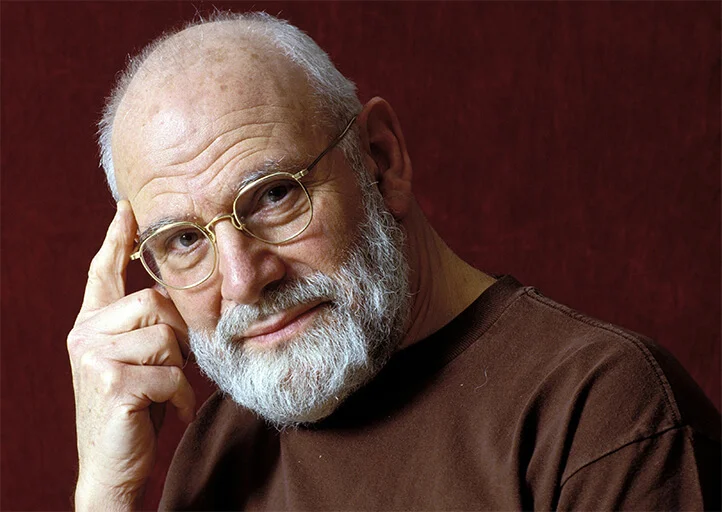
Oliver Sacks was an outstanding neurologist and writer whose literary works are dedicated to the fascinating and mysterious aspects of the human brain. His books combine deep medical understanding with the art of storytelling. They tell stories of patients with rare and unusual neurological disorders, often emphasizing the human experience and how people adapt to their neurological conditions.
In one of his most famous books, “The Man Who Mistook His Wife for a Hat,” Sacks describes various clinical cases in detail, showcasing the complexity and remarkable plasticity of the human brain. These stories explore the boundaries of human consciousness, memory, perception, and personality.
Although many of his patients faced challenges due to their conditions, Sacks always sought to highlight their dignity, resilience, and unique abilities. This creative approach to neuropsychology makes him one of the most recognizable and respected specialists in the field.
Oliver Sacks bridged the gap between the medical world and the general public, demonstrating how renowned psychologists and neurologists can share complex scientific concepts with a wide audience.
Conclusion
Distinguished psychologists have played and continue to play a key role in the development of psychology as a science. Their theories and research enrich our understanding of the human psyche, behavior, and cognitive processes.
Sigmund Freud introduced psychoanalysis, which revolutionized our understanding of the subconscious and the role of unconscious motives in behavior. His colleagues and followers, such as Carl Jung and Alfred Adler, expanded and modified his approaches, offering their unique theoretical frameworks.
Behavioral psychologists, such as John Watson and B.F. Skinner, shifted the focus to studying observable behavior and its conditions. This approach gave rise to many modern therapeutic methods, such as cognitive-behavioral therapy.
Humanists, particularly Abraham Maslow and Carl Rogers, emphasized human potential, self-actualization, and the search for meaning. Their approaches have sparked the study of well-being psychology and psychotherapeutic methods aimed at unlocking inner resources.
The cognitive revolution, represented by figures like Jean Piaget, Albert Ellis, and Aaron Beck, shifted the focus to mental processes such as thinking, perception, and decision-making.
Contemporary psychologists, such as Martin Seligman and Daniel Goleman, continue to expand the horizons of psychology by exploring areas like positive psychology and emotional intelligence.
Overall, the contributions of these famous psychologists and many others form a mosaic of diverse research, theories, and methods that shape the modern understanding of psychology. Their work has not only impacted the scientific community but has also greatly influenced education, medicine, business, and the everyday lives of people worldwide.
